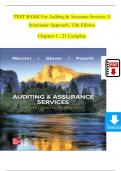Exam (elaborations)
TEST BANK For Auditing & Assurance Services: A Systematic Approach, 11th Edition By William Messier Jr, Steven Glover, Verified Chapters 1 - 21, Complete Newest Version
- Course
- Institution
- Book
TEST BANK For Auditing & Assurance Services: A Systematic Approach, 11th Edition By William Messier Jr, Steven Glover, Verified Chapters 1 - 21, Complete Newest Version TEST BANK For Auditing & Assurance Services: A Systematic Approach, 11th Edition By William Messier Jr, Steven Glover, Verified Ch...
[Show more]




